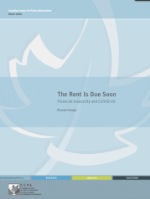Financial Insecurity and COVID-19 in Canada
Published on Fri, 2020-03-27 10:37
The report by Ricardo Tranjan examines the financial situation of the 3.4 million households in Canada who rent and whose primary source of income is wages and salaries or self-employment income. Everyone will be eventually touched by the economic impacts of the COVID-19 pandemic, but rent is due soon. Specifically, it addresses the following question: How many weeks or months can renters go without employment income before running out of savings? The short answer is that almost half of them have less than a month’s worth of savings; one-third have two weeks or less. The federal government has announced $27 billion in measures intended to mitigate the economic hardship brought about by the COVID-19 pandemic. The public response has been positive. When the economy slows down, governments are supposed to ramp up spending, making money go around, so businesses continue to operate and people continue to consume. The federal government has shown it is willing to do so, and that’s good news. But time is of the essence, and these income supports will not reach people’s bank accounts for weeks or even months. Middle-income families can tap into their savings to bridge from here to there. Low-income families don’t have the same luxury. Of particular concern is the 3.4 million Canadian households who rent and whose primary source of income is wages and salaries or self-employment income. Everyone will be eventually touched by the economic impacts of the COVID-19 pandemic, but rent is due soon. The report by Ricardo Tranjan examines the financial situation of these 3.4 million households. Specifically, it addresses the following question: How many weeks or months can renters go without employment income before running out of savings? The short answer is that almost half of them have less than a month’s worth of savings; one-third have two weeks or less. The COVID-19 crisis is evolving extremely fast. All levels of governments are putting in place measures to ensure the health and well-being of Canadian residents. As encouraging as that is, too many families are presently grappling with the question of whether they should pay the rent or use their meagre savings to buy food and other basic necessities. They need a signal from government that concrete help is on the way. They need governments to begin talking about rent deferral and rent forgiveness. The concluding section discusses what that could begin to look like in Canada. Download the report "The Rent is Due Soon" here. |


